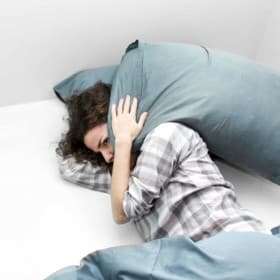Music probably plays a significant role in your life.
When you’re driving to work each morning, you’ll switch the radio on to help amp you up for the day ahead. When you’re exercising at the gym, your tunes will help you to feel motivated and powerful. Often, they can even give you a sense of strength that you can’t find elsewhere.
Music can even help you to manage times of emotional turmoil, giving you an outlet for difficult feelings. Alternatively, it can make you more creative, and open your mind.
With so much magic behind it, it’s probably no surprise that music could help with your sleeping patterns too.
When people suffer with their quality of sleep, struggling with disorders like insomnia and sleep debt, one of the first things any medical professional will recommend, is designing a relaxation routine.
This routine, combined with a good sleep hygiene strategy, can help you to overcome the most common issues you have with your evening snooze.
Studies are beginning to suggest that supplementing your relaxation strategy with music could be one of the safest ways to enhance your sleep.
After all, music has the power to change our emotions, it only makes sense that it would be useful for sleep.
Here’s your introduction into music to sleep with.
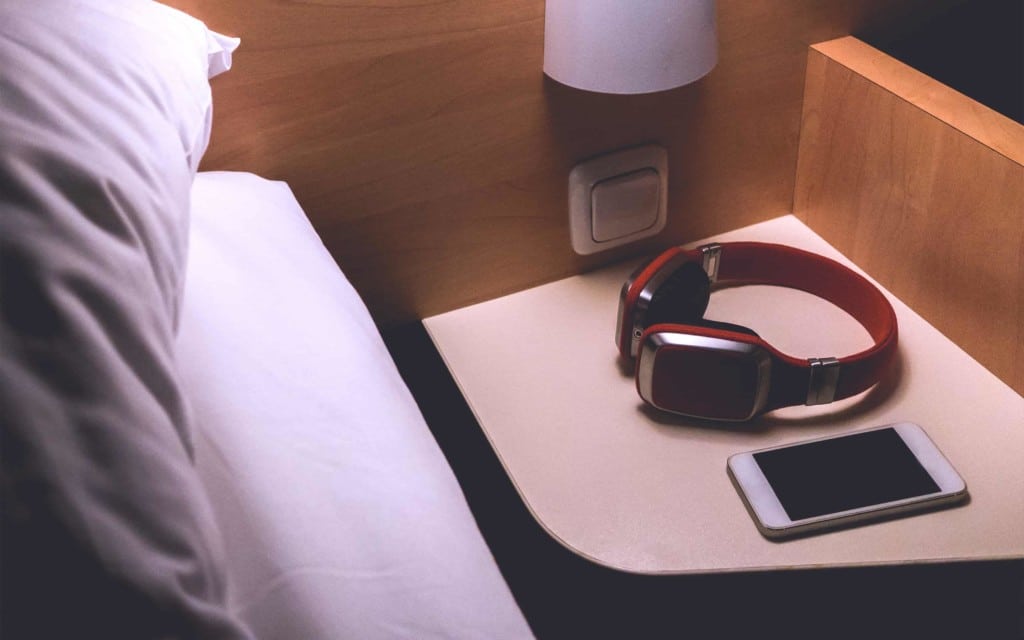
Music and sleep: The basics
When it comes to potential cures for sleep problems, music could be one of the most attractive treatments.
After all, there aren’t any dangerous side effects or addictions to worry about, which makes music a lot better than many over the counter and prescription drugs.
Of course, before you begin pinning your hopes of a good night’s sleep on your Billy Idol album, you’ll need insight into why music is so useful for sleep.
Music is more than just something that’s fun to listen to. Studies show that your tunes have a direct effect on your parasympathetic system.
The right sleep music helps your body to relax and prepare for slumber.
In fact, the research indicates that older adults who listen to 45 minutes of relaxing music before bed sleep longer, fall asleep faster, and wake up less during the night.
The biggest benefits of music for sleep generally come from how it makes you feel. Most of us feel calmer when we’re enjoying good music. That’s because the sounds we listen to have the power to lower our heart rate, reduce our breathing, and even improve our blood pressure.
All of those biological changes are similar to the changes that happen when you start to fall asleep.
Because human brains are wired to respond to music, music, and sleep can work together perfectly.
However, it’s important to remember that different kinds of songs will affect your body in very different ways.
Listening to pleasant, happy music to sleep with can improve your serotonin levels. When you’re happy, you’re more likely to relax, ready for sleep.
Similarly, listening to music that makes you feel excited will ramp up your cortisol and adrenaline levels, getting you ready for action.
Music can even trigger parts of the hippocampus. That’s the part of your brain that’s responsible for memory storage.
Songs you’re familiar with from your past can give you more vibrant dreams, and put you on the path to a less upsetting sleep — particularly if you suffer frequently with nightmares.
Before we continue check out these great products on Amazon.
Can listening to music help you sleep?
The research into music to help you sleep indicates that the right tunes can have a positive impact on your slumber.
However, there are exceptions to the rule. For instance, loud noises (more than 95 decibels) are more likely to keep you awake.
Additionally, sounds that stimulate the body and elevate your heart rate will generate the wrong response in your body.
Listening to ACDC on full blast when you’re getting ready for bed may not be the right way to relax.
So, can listening to music help you sleep? Yes, but you need to choose the right music.
If you’re listening to music while sleeping that makes you feel happy and relaxed, then you can definitely fall asleep faster and get a better quality of rest.
From a physiological perspective, calming music will:
- Slow your breathing
- Ease muscle tension
- Reduce anxiety and stress
- Trigger the release of serotonin
- Lower your heart rate and blood pressure
- Quiet the nervous system
- Reduce hormones like cortisol
At the same time, if you start integrating music into your bedtime routine, it can become an important component of good sleep hygiene.
If your mind and body gets used to responding to a certain selection of songs when you’re going to bed each night, it will begin to associate those sounds with falling into a deep snooze.
The routinized aspect of playing certain songs before bed can give your body the signal it needs to start shutting down for sleep.
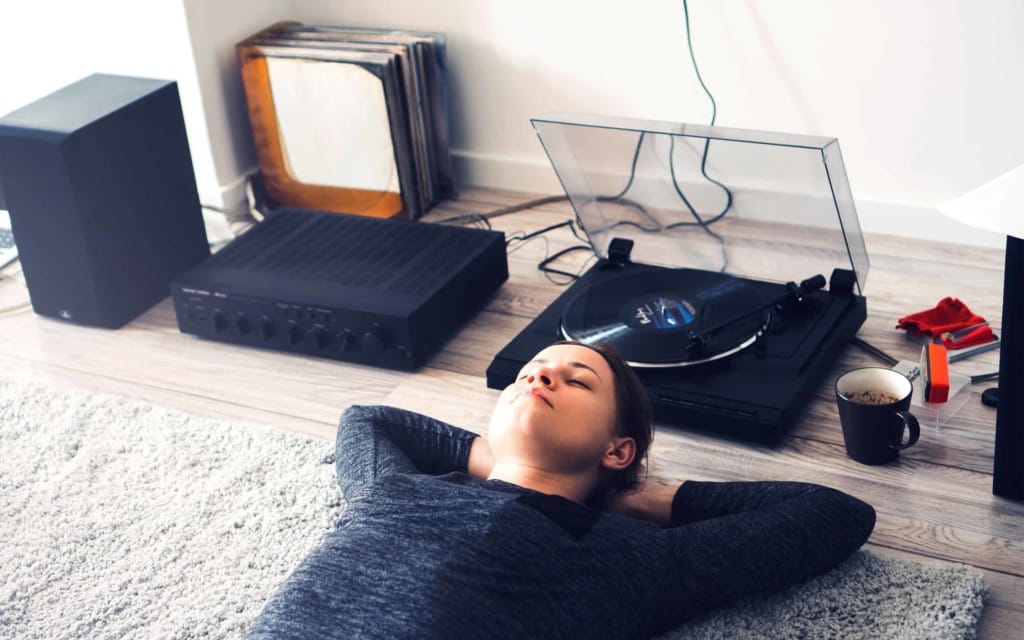
Are there benefits to listening to music while sleeping?
Clearly sleep music is a real and valuable thing. Your songs trigger changes in the body that mimic the perfect sleep state, getting you ready for bed.
Music also has a soothing effect on your emotional brain, reducing anxiety and stress. If you’re listening to music to help you sleep before bed, then you’re basically “tuning in” to sleep mode.
So, how exactly can listening to music help you sleep?
One of the most important ways that music helps, is indirectly. You don’t need to be a scientific expert to know that music affects your emotional state.
Your mood also plays a significant role in how well you sleep. Stress is one of the most common challenges that keeps people awake each night.
Feelings of depression, anxiety can significantly harm your ability to fall asleep.
Fortunately, music helps to reduce those feelings of panic and stress. Choose the right calming, relaxing music, and your body will begin to slow down all those processes that are keeping you on high alert.
Your heart rate will reduce, your breathing will slow, and you’ll start to feel the serotonin boost that comes with listening to something you enjoy.
In other words, you get into the perfect mental state for a good night’s sleep.
The benefits of music to help you sleep aren’t just emotional. As mentioned above, a lot of our response to tunes is physical. That’s because your brain is wired to adjust your parasympathetic system when you hear certain songs.
Your body physically responds to the music you hear, and this not only calms you down, but can help with reducing pain and physical discomfort too.
If stress isn’t the thing that keeps you awake each night, but you struggle with things like chronic pain or discomfort, music could be a good treatment.
Combined with essential oils, regular exercise, and natural treatments, your music could give you the pain relief you need to finally let go and fall into a peaceful snooze.
After all, not only does pain keep you awake, but the worse you sleep, the more sensitive to pain you become. Studies have shown that insomnia can lead to lower pain tolerance.
The good news? Improve your sleep, and your pain improves with it. Studies have shown that listening to music before, after, and during surgeries can significantly reduce pain and anxiety.
Additionally, patients that listen to music when dealing with chronic ailments are generally less dependent on pain medication.
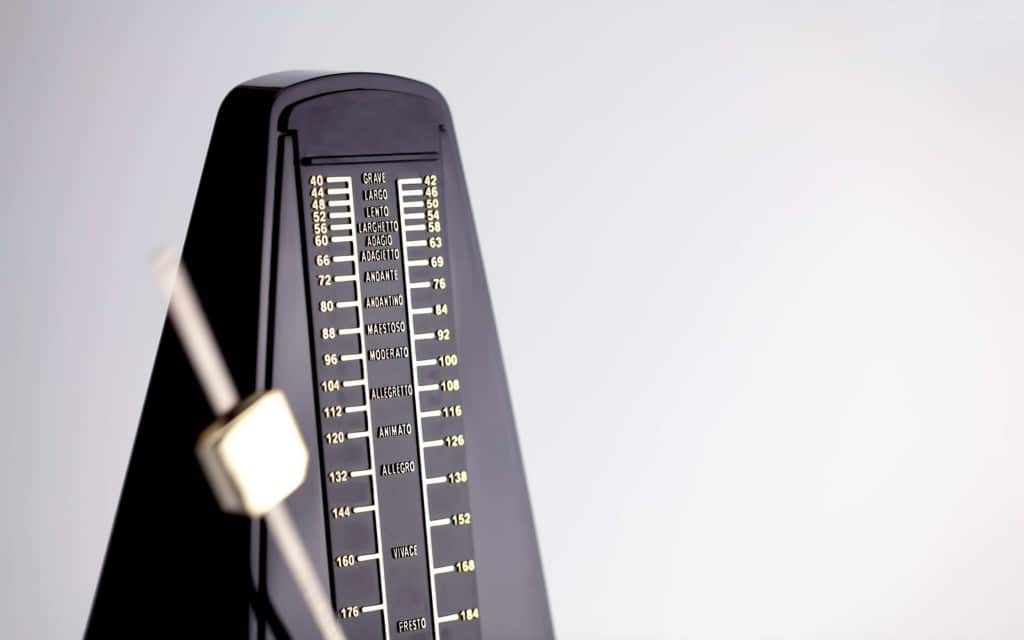
Sleep music: What kind of music should you try?
So, as studies from around the world continue to tout the many benefits of sleep music, you might be wondering what kind of tunes you should be listening to.
After all, not all songs are going to be perfect for nodding off to. Heavy rock and hip-hop songs aren’t exactly the perfect lullaby.
Fortunately, researchers have discovered that your selection of choices when it comes to music for sleep is pretty varied.
You should be able to get a good night’s rest listening to any music with a tempo of around 60 beats per minute.
The 60 beats per minute rule means that the music you choose will match your resting heart rate. This makes it easier for your body to align itself to whatever you’re listening to.
You could try Joni Mitchell’s Blue Room Hotel, for instance.
Alternatively, classical music is usually a good choice for sleep support. In a 2006 study, a group of students with problems falling asleep split into 3 groups.
Each group in that study listened to a different sound for 45 minutes before bedtime, including classical music, audio books, and silence.
The group listening to classical music showed a distinct improvement in their ability to fall and stay asleep. This may have something to do with the impact that classical music has your body and your heart.
Studies have showed that people listening to classical music generally benefit from lower heart rates and reduced blood pressure.
Choosing classical tunes for your sleep music is hence a good idea. So, what if you don’t enjoy listening to Beethoven or Bach?
Studies also suggest that the best impact on your sleep comes from listening to music you enjoy.
If you hate the sound of whatever you’re listening to, you’re not going to get the relaxation or serotonin boost that you need.
If classical music just isn’t your jam, then you can consider listening to just about any song that you see as “sedative” in nature.
Try and aim for that tempo of 60 beats per minute that we mentioned above — and don’t go any higher than 80 beats.
This will give you a range of options like “Lay Me Down” by Sam Smith, or “Thinking Out Loud” by Ed Sheeran.
Remember, listening to music that you enjoy listening to is crucial.
Additionally, pairing your sedative music with other techniques for relaxation, such as exercises before bed, or meditation can be very useful too.
Something simple, like progressive muscle relaxation when you’re sitting in bed, listening to your favourite tunes, can put you in the perfect mindset to drift off into a peaceful sleep.
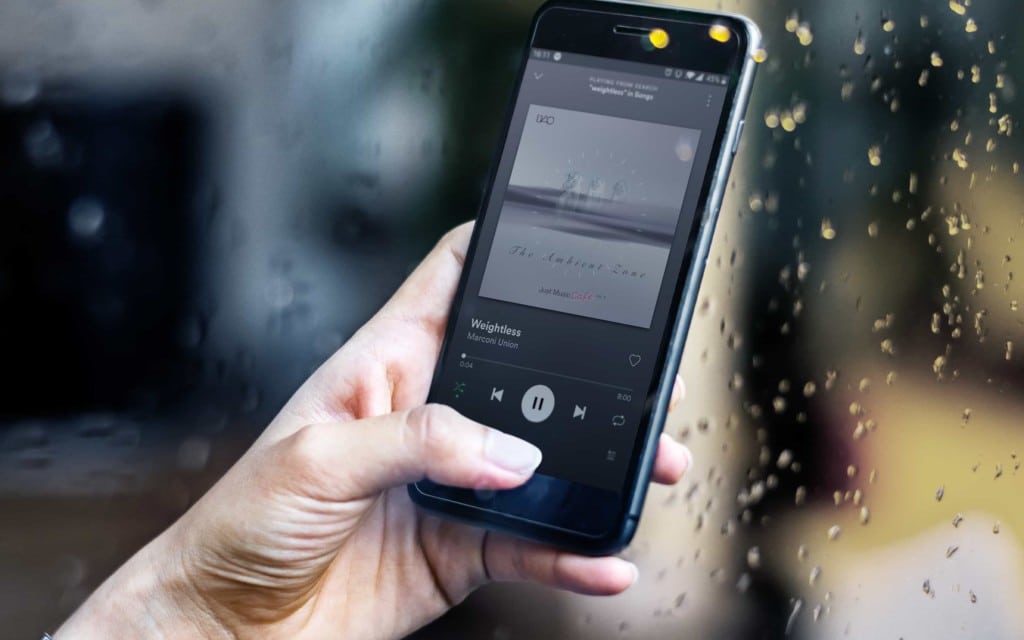
Music to sleep to: The most relaxing songs
If you’re relatively flexible with your taste in music, then maybe you’re willing to try something new for the benefit of your sleeping patterns.
You could consider creating a playlist with some of the world’s most relaxing songs.
The British Academy of Sound Therapy considered music and sleep to be so wonderfully intertwined, that they decided to make a list of songs perfect for helping you to get to sleep.
In fact, the research led to the birth of the world’s most incredible song for peace and meditation: Weightless, by Marconi Union.
According to the institution responsible for creating the tune, the song can reduce blood levels of cortisol, and decrease blood pressure.
Those listening to the song reported an overall reduction in anxiety of up to 65%.
The great thing about Weightless is that it starts with that all-important 60 beats per minute rhythm, then gradually slows down to only 50 beats per minute.
Because your heart-rate strives to match the rhythm of the music that you’re listening to, it gradually slows too.
Additionally, the intervals between notes and unsystematic chimes help to promote a deeper state of relaxation.
The top 10 songs to consider include (in no particular order):
- Weightless, by Marconi Union
- We Can Fly, by Café Del Mar
- Someone like you, by Adele
- Canzonetta Sull’aria by Mozart
- Strawberry Swing by Coldplay
- Pure Shores by All Saints
- Please Don’t Go by Barcelona
- Watermark by Enya
- Mellomaniac by DJ Shah
- Electra, by Airstream
Tips to consider with music for sleep
Clearly, the answer to “does listening to music help you sleep?” is a resounding yes. However, you need to make sure that you’re using your new sleep aid properly.
Aside from listening to the right music for sleep, there are other things that you can do to improve your chances of a good night’s rest.
For instance:
Meditate while you listen
A yoga or meditation session while you’re listening to the right music can help you to soothe your body. Slow beats are best.
Remember that your brain and body are both highly responsive to music. Using songs that have a rhythm of around 60 beats per minute will get you on the right track.
Avoid emotional triggers
Your choice of music to help you sleep should always be comforting and happy. Avoid anything that’s going to get you too excited or make you too sad. Strong emotions can be more likely to keep you awake.
Stay away from lyrics
While some people can sleep well when listening to music with lyrics, other people find it difficult to drift off, because their mind follows along with the words. If you’re struggling to shut down, choosing music without lyrics will be the best option.
Be consistent
Once you find a playlist that works for you, stick with it. Listen to your music as part of your regular routine at the same time each night. This will help to encourage a stronger sleeping pattern by helping your body to associate certain sounds with sleep.
Improve the rest of your sleeping environment
Remember that your entire bedroom needs to be comfortable for you to feel your best when you’re drifting off to sleep.
Block out light that might keep you awake and get rid of any unwanted noise. A cool bedroom with a warm bed is often a good idea too.
Avoid using earbuds
Although headphones might be necessary if you’re sleeping next to a partner, they can also be problematic.
Using headphones for listening to music while sleeping can damage your ear canal. Additionally, there’s a risk that you could end up getting tangled in the wires, putting you at risk.
Remember to pay attention to how you feel as you’re listening to your music each evening too.
The experience that you have with music for sleep is a very individual one. Different people react in unique ways to different songs.
If things like classical music don’t work for you, then you might want to consider another kind of playlist.
There’s no one-size-fits-all solution with music and sleep.
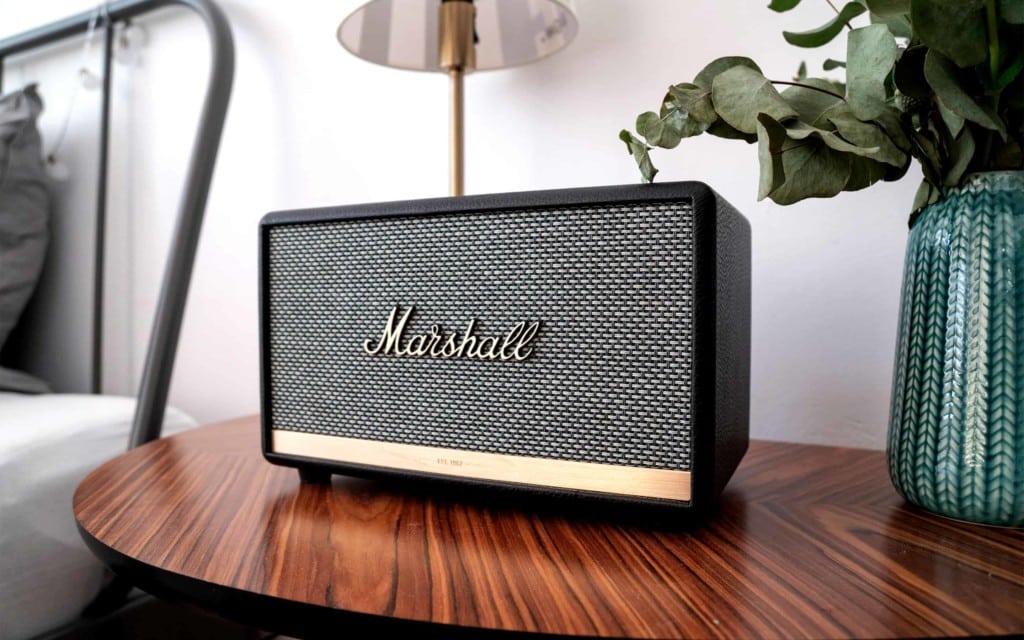
Listening to music while sleeping
Like forest bathing and meditation, music is just one of the many natural strategies that people can use to improve their chances of a good night’s sleep.
If you frequently struggle to drift off at night, and you don’t want to be one of those people who relies on medication, then exploring the connection between music and sleep could be helpful for you.
After all, by the time you lie down in bed each night, you’re likely to have a million thoughts running through your head.
Music can help to take your mind off the daily distractions and feelings of stress that can stop you from falling into a deeper slumber.
All you need to do is find the music that works best for you.
Remember, start with slow rhythms and classical tunes.
If they don’t work, stick to the music that you enjoy and see whether the positive mood boost will help you to feel more capable of falling asleep.
In the meantime, if your problems with sleep continue, you can find more guidance and advice here at Siestio.
However, remember that you should always seek help from a doctor if you’re worried about your sleeping patterns. A medical professional will be able to guide you towards the right treatment for you.
Siestio. Sleep Matters.
General advice disclaimer
This article contains general tips and advice. However, no health promoting program should be started without consulting your physician or other industry professional first. For more information read our full disclaimer here.



